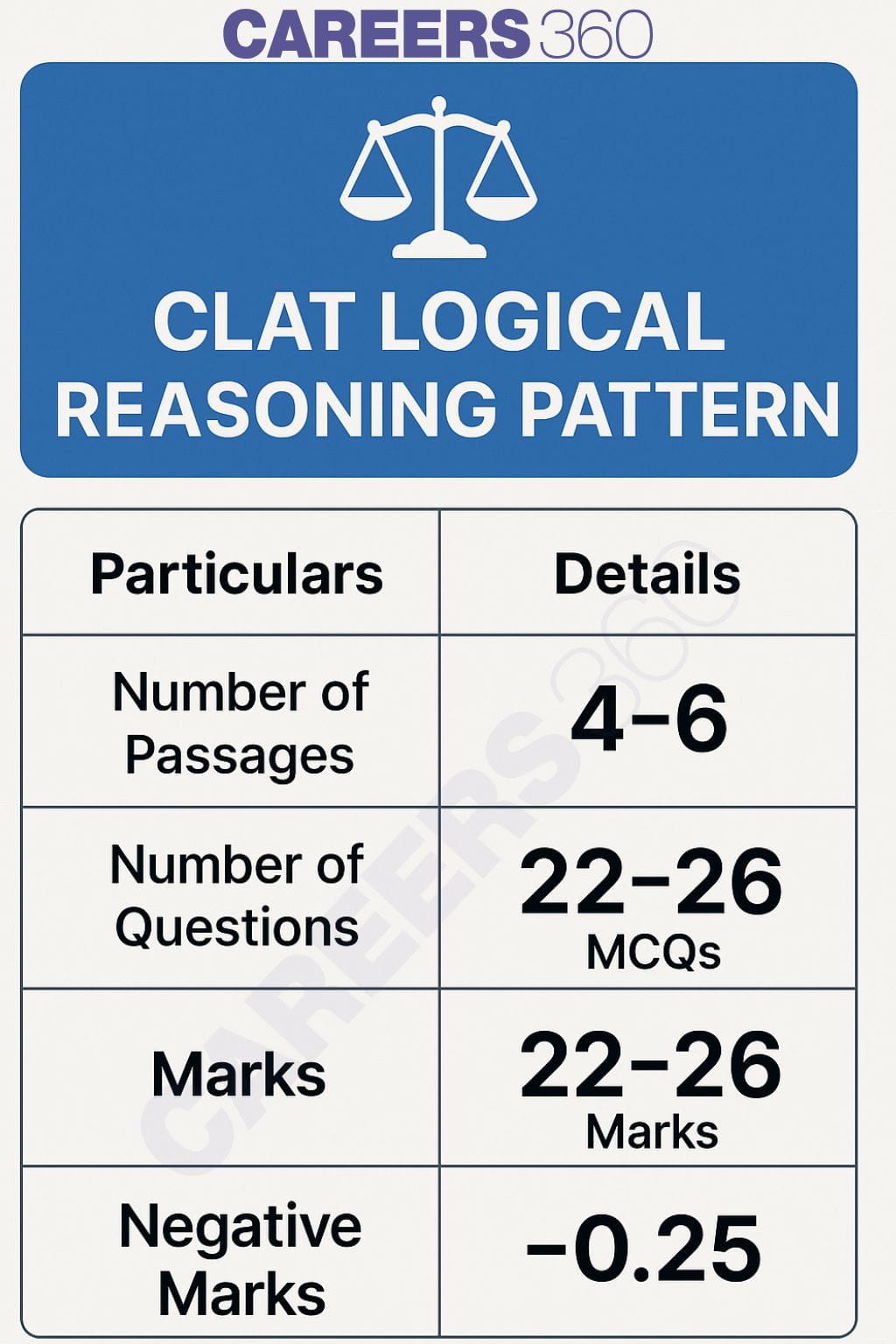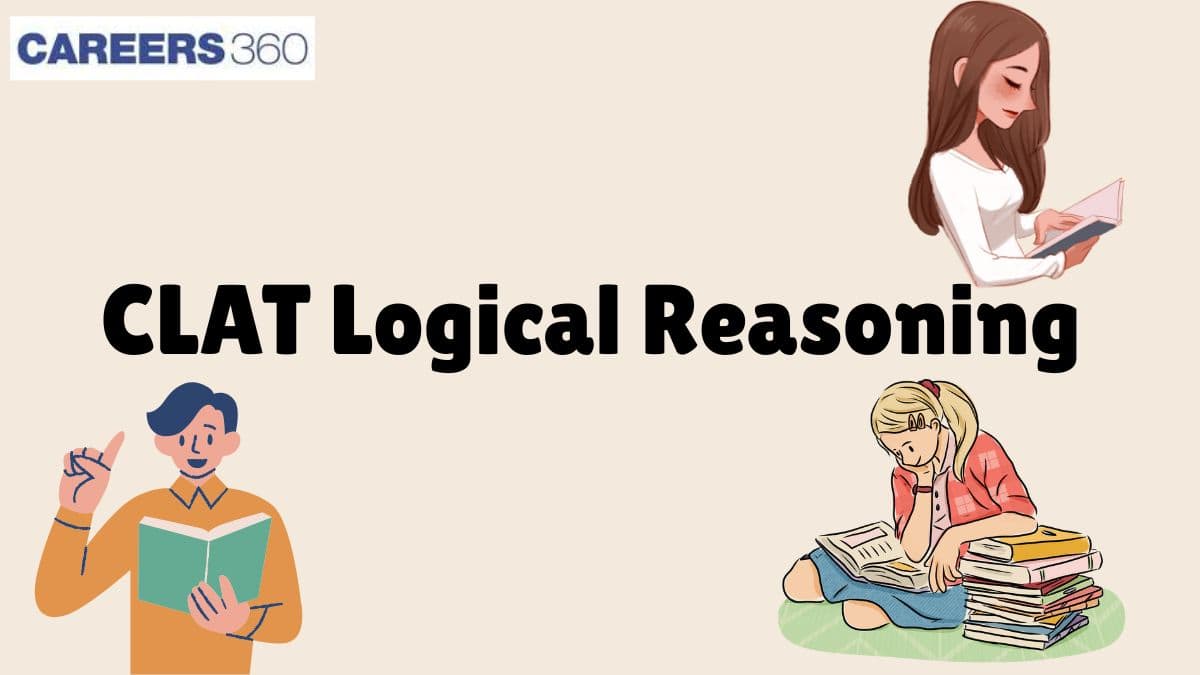The Common Law Admission Test (CLAT) 2026 exam is scheduled for Sunday, December 7, 2025, from 2:00 pm to 4:00 pm, conducted in a single offline session. The CLAT exam comprises 120 multiple-choice questions with subjects including English language, current affairs, legal reasoning, logical reasoning, and quantitative techniques. The CLAT logical reasoning has a 20% weightage and is one of the important components of the CLAT exam. The CLAT logical reasoning syllabus in the Common Law Admission Test evaluates the ability to reason rationally and logically, an essential skill any lawyer must possess as they win cases by presenting logical arguments.
The Logical Reasoning section in CLAT 2026 will comprise short passages of about 450 words each, followed by one or more questions that evaluate critical thinking and argument analysis. The logical reasoning for CLAT 2026 will have 22-26 multiple-choice questions. In order to come on top, the candidates should do their homework well. In this article, aspirants can find all the details, including the important topics in CLAT logical reasoning, question patterns, and the best books. So, continue reading below.
What is CLAT Logical Reasoning?
The logical reasoning for CLAT 2026 is the section that requires the candidate to apply critical thinking and rational thinking to delve into a situation in the problem statement, identify underlying assumptions, and draw conclusions from it.
CLAT Logical Reasoning MCQs
CLAT Logical Reasoning Syllabus and Pattern Overview
The number of CLAT logical reasoning questions varies between 22 to 26 as per the revised pattern. The logical reasoning section has a 20% weight in the overall CLAT paper. This section comprises 4 to 6 passages that are around 300 words long and include MCQs based on the passage. The passages in the CLAT logical reasoning sections are extracted from editorials in popular newspapers such as The Telegraph. They could also be drawn from articles in popular magazines.
CLAT 2026 Logical Reasoning Pattern
| Particulars | Details |
|---|
Number of Passages | 4-6 |
Number of Questions | 22-26 MCQs |
Marks | 22-26 Marks |
Negative Marks | -0.25 |
Infographics - CLAT 2026 Logical Reasoning Pattern

The questions will test the candidate’s ability to do the following:
Identify an argument, its presumptions, and inferences.
Quickly framing an argument after reading the passage
Finding patterns in reasoning and understanding how a change in a premise can change the conclusions drawn from it.
Draw conclusions from the passage and apply them in fresh contexts.
Establish linkages and analogies, look for inconsistencies and equivalents, and evaluate the persuasiveness of arguments.
Also check - CLAT English Language
CLAT 2026 Logical Reasoning Important Topics
Given below are a few important topics included in the logical reasoning section for CLAT
Drawing Analogies: It involves comparing two situations and understanding their similarities.
Statements and Drawing Conclusions: It involves drawing inferences from a given set of statements
Statements and Making Assumptions: It deals with identifying the likely result by making certain assumptions about a given situation
Identifying Cause and Effect Relationships: It involves determining the underlying factors that led to a particular situation or result.
You may also check
CLAT Logical Reasoning Sample Papers
While knowing the content of the syllabus is important, what will take the candidates over the line is continuous practice. So, knowledge of what the paper will look like becomes important. Practising with sample papers helps the candidates replicate exam like situation in terms of time pressure, and this improves speed. It also gives an accurate measure of the level of one's preparation. It can be done by getting hold of CLAT exam sample papers.
In a bid to familiarise the candidates with the CLAT exam pattern, the Consortium of National Law Universities publishes sample papers that can be downloaded from their official website. Another essential aspect of preparing for the CLAT exam is to practise CLAT previous year’s question papers.
You may also read
UPES Integrated LLB Admissions 2026
Ranked #18 amongst Institutions in India by NIRF | Ranked #1 in India for Academic Reputation by QS Rankings | 16 LPA Highest CTC
Lovely Professional University | Law Admissions 2026
India's Largest University | BCI approved | Meritorious Scholarships up to 5 lacs |
CLAT Logical Reasoning Sample Question
Here’s a sample passage drawn from the logical reasoning section of the CLAT 2025 question paper, followed by a few questions. It will give a clear idea about what to expect in the exam.
Being a consultant, your work consists of a deep examination of the company’s
environment and its internal system to notice inefficiencies and potential improvements.
The interaction with the company’s management and different sections to decipher
their objectives, opportunities, and processes. This means that, through the use of
data analysis, industry best practices, and the formulation of creative ways of solving
all problems, to come up with unique solutions to all problems to increase efficiency
and productivity, and hence, increase profitability for employers. This might entail
operations such as logistics redesign, business process reengineering, adopting new
applications, systems, or even community relations programs. People management is a
critical component of change management, to make sure that all the relevant parties
interpret the potential alterations positively. Also, to offer orientation and create
resources to explain the changes to the group and make it comfortable with the shift.
The general goal is the organisation’s ability to continue to grow and remain relevant
with the shareholders and stakeholders in the industries it operates.
Q. What is the primary responsibility of you being a company’s efficient consultant?
(A) Analysing the organisation’s structure, processes, and market position
(B) Managing daily operations
C) Hiring new employees
(D) Conducting maintenance
Q. With whom does a consultant work closely to understand a company’s goals and challenges?
(A) Customers
(B) Higher management and various departments
(C) External vendors
(D) Competitors
Q. Imagine yourself as a consultant and find what methods you will use to develop
customised solutions?
(A) Intuition and guesswork
(B) Social media trends
(C) Random selection
(D) Data analysis, industry best practices, and innovative strategies
Q. Which of the following might a consultant optimise to improve company
efficiency?
(A) Office decoration
(B) Supply chain management
(C) Employee dress code
(D) Lunch menus
Q. Why is communication the most relevant thing for a consultant?
(A) To ensure all stakeholders understand the proposed changes
(B) To organise consumer meets
(C) To update the company website
(D) To manage the human resources
Q. What additional support might a consultant provide to help the team adapt to
new processes?
(A) Planning a retreat for the team members
(B) Training and support
(C) Personal counselling
(D) Mental Health programs
Also, check -


